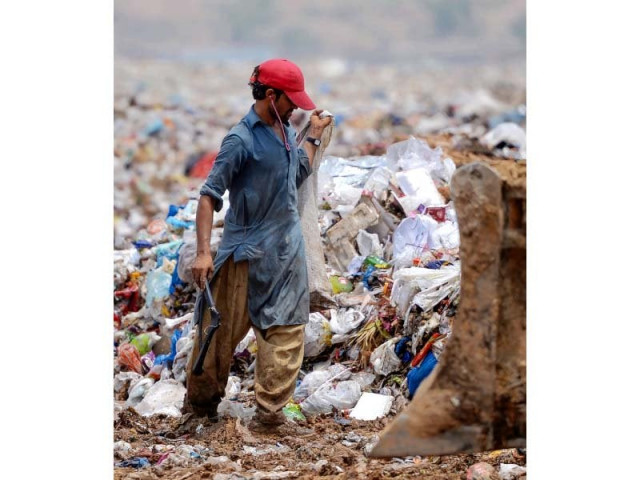Drowning in trash: Pakistan among top river dumpers of plastics
As authorities fail to arrest trends and dispose of trash, researchers look for enzymes to dissolve waste

A rag-picker collects recyclable materials at a garbage dump in Islamabad. PHOTO: AFP
According to the UN, around a million plastic drinking bottles are purchased every minute around the world, while up to five trillion single-use plastic bags are used worldwide every year —half of which are designed to be used only once and then thrown away.
Today 300 million tonnes of plastic waste is produced every year — nearly the weight of the entire human population. Of this, a staggering eight million tonnes of plastic ends up in the world’s oceans every year, flowing down the world’s rivers, which serves as a direct conduit of trash from the world’s cities to the marine environment.
Of the world’s rivers, 10 carry more than 90 per cent of the plastic waste which ends up in the oceans.
China’s Yangtze River leads with 1.467 million tonnes while the Indus River in Pakistan is second with 164,332 tonnes and the Yellow River in China is third with 124,249 tonnes.
In Pakistan like elsewhere, the municipal authorities and the environmental regulatory bodies have failed to enforce their respective regulations to stop the dumping of garbage on such a mass scale into the rivers.
DHA told to clear trash along coast by May 15
Degradable plastics
To tackle the issue, many countries in Asia, Europe and the US have somewhat controlled the disposal of plastic waste by introducing oxo-biodegradable plastics along with some biodegradable shopping bags. But there is no mechanism to test the environmental-friendly tags of these products.
“The technology is simple which neither requires alteration by machinery nor process: a small Olefin-based additive is mixed with the raw material (plastic granules) to develop biodegradable properties in plastic and bags made with this technology — if left in the open air or in water —gradually weaken and vanish, leaving behind humus (a non-toxic product),” an EPA official explained the principle behind the oxo-biodegradable plastics.
However, another official said that biodegradable plastic bags too did not offer the solution since visible pollution converts into permanent and invisible pollution.
Plastic eating bacteria
According to a recent global survey, only nine per cent of all plastic waste ever produced has been recycled while a further 12 per cent has been incinerated. This still leaves 79 per cent of plastic waste which has accumulated in landfills, dumps or natural environment.
Cigarette butts, whose filters contain tiny plastic fibres, were the most common type of plastic waste found in the environment followed by drink bottles, bottle caps, food wrappers, grocery bags, drink lids, straws and stirrers.
To tackle this issue, a group of researchers at the Quaid-i-Azam University (QAU) in the capital have spent the past decade studying and exploring the potential of microorganisms, such as bacteria and fungi, in degrading synthetic plastics like polyvinyl chloride, polystyrene and polyethene.
The research work is focused on isolation, screening and molecular characterisation of plastics, degrading indigenous microbial isolates and to evaluate their degradation potential through different techniques.
World Earth Day: Give up use of plastic and save the environment
“Our group is investigating fungal enzymes, particularly peroxidases, which are a key class of enzymes having extensive commercial applications in delignification of lignocellulosic materials, elimination of recalcitrant organic pollutants and enzyme-catalyzed polymerization,” said Dr Ishtiaq, the head of QAU’s Microbiology Department.
He added that adding that they had successfully conducted molecular characterisation of fungal enzymes (peroxidases) responsible for degradation of plastics. “We successfully produced, purified and tested fungal enzyme (Lignin Peroxidase and manganese Peroxidase) having the potential for oxidation of complex polymeric substrates. Scanning Electron Microscopy and Fourier Transform Infra-Red analysis of polymer surface proved the proposed involvement of this enzyme for polymer degradation under optimized conditions,” he said.
Published in The Express Tribune, June 6th, 2018.



















COMMENTS
Comments are moderated and generally will be posted if they are on-topic and not abusive.
For more information, please see our Comments FAQ